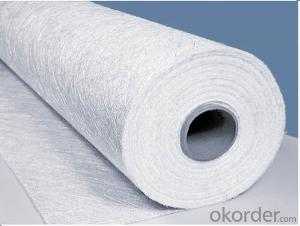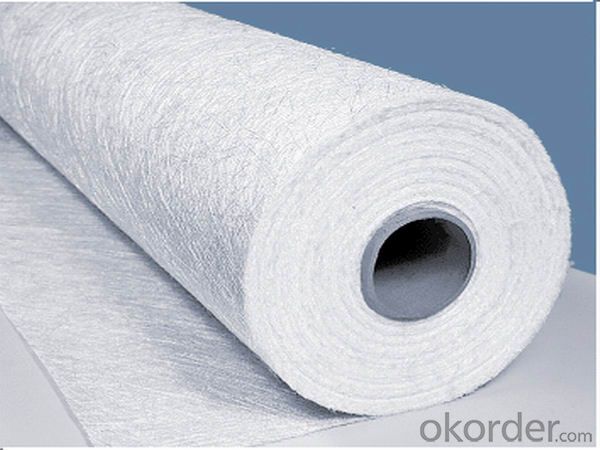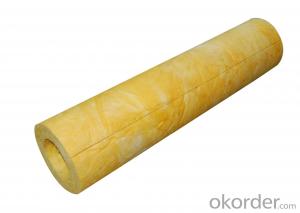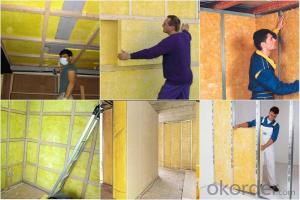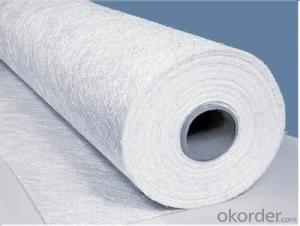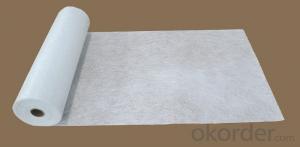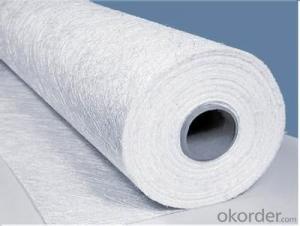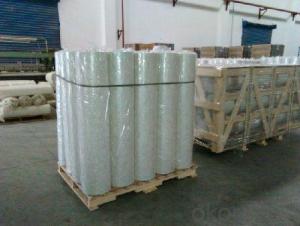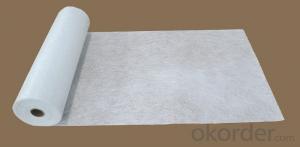Fiberglass Mat Tissue E Glass Powder Bonded Chopped Strand Mat
- Loading Port:
- Shanghai
- Payment Terms:
- TT or LC
- Min Order Qty:
- 20000 kg
- Supply Capability:
- 200000Kg Per Month kg/month
OKorder Service Pledge
OKorder Financial Service
You Might Also Like
1.Brief Introductions
E-Glass Powder Chopped Strand Mat is made of randomly distributed chopped strands held together by a powder binder.
It is compatible with UP, VE, EP, PF resins.
It is designed for use in hand lay-up, filament winding, compression molding and continuous laminating processes. Its end-use applications include boats, bath equipment, automotive parts, chemical corrosion resistant pipes, tanks, cooling towers and building components
2.Product Features
Fast breakdown in styrene
Superior acid corrosion resistance
3.Product Specifications
Property | Area Weight | Moisture Content | Size Content | Breakage Strength | Width |
(%) | (%) | (%) | (N) | (mm) | |
Property | IS03374 | ISO3344 | ISO1887 | ISO3342 | |
EMC80P | ±7.5 | ≤0.20 | 8-12 | ≥40 | 50-3300 |
EMC100P | ≥40 | ||||
EMC120P | ≥50 | ||||
EMC150P | 4-8 | ≥50 | |||
EMC180P | ≥60 | ||||
EMC200P | ≥60 | ||||
EMC225P | ≥60 | ||||
EMC300P | 3-4 | ≥90 | |||
EMC450P | ≥120 | ||||
EMC600P | ≥150 | ||||
EMC900P | ≥200 |
Special specification can be produce according to customer requirements.
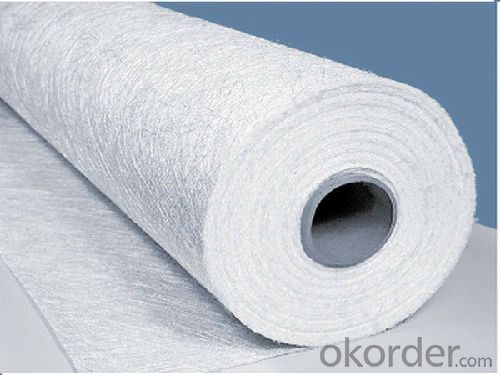
4.FAQ
Packaging:
Each Chopped Strand Mat is wound onto a paper tube which has an inside diameter of 76mm and the mat roll has a diameter of 275mm. The mat roll is wrapped up with plastic film,and then packed in a cardboard box or wrapped up with kraft paper. The rolls can be vertically or horizontally placed. For transportation, the rolls can be loaded into a cantainer directly or on pallets.
- Q: How is fiberglass mat tissue used in the production of windshields?
- Fiberglass mat tissue is a crucial component in the production of windshields due to its unique properties and functions. When manufacturing windshields, the fiberglass mat tissue is used as a reinforcement material to enhance the strength and durability of the glass. During the production process, a layer of fiberglass mat tissue is inserted between two layers of glass to create a laminated structure. This layer acts as a barrier, preventing the glass from shattering into small dangerous pieces upon impact. It helps to hold the glass together, providing safety to the vehicle occupants. The fiberglass mat tissue serves as a reinforcing material, improving the mechanical properties of the windshield. It enhances the impact resistance, making the windshield less prone to cracks or chips from stones, debris, or other objects that may hit it while driving. This reinforcement also adds structural integrity to the windshield, allowing it to withstand extreme weather conditions and vibrations without compromising its functionality. Furthermore, the fiberglass mat tissue helps to reduce noise transmission and vibrations. It has sound-damping properties, which contribute to a quieter and more comfortable driving experience by reducing external noise from entering the vehicle cabin. Additionally, the use of fiberglass mat tissue allows for the production of curved windshields. The flexibility of the material enables it to conform to different shapes and contours, allowing manufacturers to create windshields with customized designs and improved aerodynamics. In summary, fiberglass mat tissue plays a vital role in the production of windshields. Its reinforcement properties enhance the strength and impact resistance of the glass, providing safety to the vehicle occupants. It also contributes to a quieter driving experience and enables the production of curved windshields with improved aerodynamics.
- Q: Does fiberglass mat tissue require any special handling precautions?
- Special handling precautions are required for fiberglass mat tissue. Mishandling fiberglass mat tissue can result in the release of small glass fibers into the air. Inhalation of these fibers can lead to skin irritation, eye irritation, and respiratory problems. Therefore, it is necessary to wear appropriate protective clothing, including gloves, long-sleeved shirts, pants, and safety goggles, when dealing with fiberglass mat tissue. Working in a well-ventilated area or using respiratory protection is recommended for confined spaces. Furthermore, the material should be handled gently to prevent the release of additional fibers. Proper disposal methods must be followed to avoid any potential harm. By following these precautions, the safety and well-being of individuals handling fiberglass mat tissue are ensured.
- Q: Can fiberglass mat tissue be used for HVAC insulation?
- No, fiberglass mat tissue is not suitable for HVAC insulation. It is primarily used for reinforcing materials in construction and composite manufacturing. HVAC insulation requires specific materials with thermal resistance properties to effectively control temperature and reduce energy loss.
- Q: What is the thermal conductivity of fiberglass mat tissue?
- The thermal conductivity of fiberglass mat tissue is typically low, ranging from 0.03 to 0.06 W/m·K.
- Q: How does the roll weight of fiberglass mat tissue affect its transportation?
- The roll weight of fiberglass mat tissue can have a significant impact on its transportation process. The weight of the roll determines the ease of handling and the logistics required for transportation. Firstly, a heavier roll weight can make it more challenging to move and handle the fiberglass mat tissue. If the roll is too heavy, it may require specialized equipment or machinery for loading and unloading, such as forklifts or cranes. This can add complexity and cost to the transportation process. Moreover, the weight of the roll also affects the packaging and storage requirements during transportation. Heavier rolls may require sturdier packaging materials and additional precautions to ensure their stability and prevent any damage during transit. This can include using pallets, strapping, or other securing methods to prevent the roll from shifting or falling during transportation. The weight of the roll also impacts the overall cost of transportation. Heavier rolls can increase shipping costs, as carriers often charge based on weight. Additionally, the weight of the roll can affect the number of rolls that can be transported in a single shipment, which can impact the efficiency and cost-effectiveness of the transportation process. In summary, the roll weight of fiberglass mat tissue plays a crucial role in its transportation. It affects the ease of handling, packaging requirements, and overall cost of transportation. Therefore, it is essential to consider the roll weight when planning and organizing the logistics for transporting fiberglass mat tissue.
- Q: Is fiberglass mat tissue suitable for chemical storage tanks?
- Fiberglass mat tissue is generally considered suitable for chemical storage tanks. Fiberglass itself is known for its excellent chemical resistance properties, making it a popular choice for storing a wide range of chemicals. Additionally, fiberglass mat tissue is typically used as a reinforcement layer in the construction of fiberglass tanks, providing added strength and durability. However, it is important to note that the specific chemical being stored must be taken into consideration. Some highly corrosive or reactive chemicals may require more specialized materials or additional protective coatings to ensure the integrity of the storage tank. Therefore, it is always recommended to consult with a professional engineer or manufacturer to determine the most suitable materials for a specific chemical storage application.
- Q: What is the delamination strength of fiberglass mat tissue?
- The delamination strength of fiberglass mat tissue refers to its ability to resist the separation or detachment of layers within the material. This strength is dependent on various factors such as the quality of the resin used, the thickness and density of the mat, and the manufacturing process. Fiberglass mat tissue is typically designed to have a high delamination strength to ensure its durability and structural integrity. The mat is composed of multiple layers of glass fibers held together by a binder or resin. The bonding between these layers is crucial in preventing delamination. The delamination strength of fiberglass mat tissue can be determined through various testing methods, such as the peel test, where the force required to separate the layers is measured. This test provides valuable information about the adhesive strength between the layers and helps in assessing the overall quality of the material. The delamination strength can vary depending on the specific application and requirements. For example, fiberglass mat tissue used in construction or automotive industries may have different delamination strength specifications compared to those used in marine or aerospace applications. Manufacturers typically provide technical data or specifications indicating the delamination strength of their fiberglass mat tissue products. It is important to note that the delamination strength of fiberglass mat tissue can be influenced by external factors such as exposure to extreme temperatures, moisture, or chemical substances. Therefore, proper installation, maintenance, and adherence to recommended usage guidelines are essential to maintaining the desired delamination strength and overall performance of the material.
- Q: Can fiberglass mat tissue be used for repairing fiberglass bathtubs?
- Yes, fiberglass mat tissue can be used for repairing fiberglass bathtubs. Fiberglass mat tissue is a thin, flexible material that is used for reinforcing and strengthening fiberglass surfaces. It is commonly used in the repair and restoration of fiberglass products, including bathtubs. The mat tissue is typically applied over the damaged area, along with a layer of resin, to create a strong and durable repair. The mat tissue helps to reinforce the weakened or damaged areas of the bathtub, restoring its integrity and preventing further damage. However, it is important to note that the success of the repair will depend on the extent of the damage and the skill of the person performing the repair. It is recommended to consult a professional or follow manufacturer's instructions for the best results.
- Q: How does fiberglass mat tissue perform in terms of moisture vapor resistance?
- Fiberglass mat tissue is generally effective at resisting moisture vapor. It acts as a barrier, preventing the passage of water vapor and making it suitable for moisture control in applications like roofing and insulation. To enhance the moisture vapor resistance of fiberglass mat tissue, it can be combined with other materials like vapor barriers or moisture-resistant coatings. These additional layers provide extra protection against moisture infiltration, improving the overall performance of the fiberglass mat tissue. However, it should be noted that the moisture vapor resistance of fiberglass mat tissue can vary depending on factors such as thickness, density, and composition. Thicker and denser mats tend to offer higher resistance, while the presence of manufacturing additives or coatings can also affect the material's properties. In conclusion, fiberglass mat tissue is known for its moisture vapor resistance, but its performance may be influenced by various factors. It is recommended to consult product specifications or manufacturers' recommendations to determine the specific moisture vapor resistance of a particular fiberglass mat tissue product.
- Q: Is fiberglass mat tissue suitable for insulation in HVAC ducts?
- Fiberglass mat tissue can be used to insulate HVAC ducts, as it possesses excellent thermal and acoustic properties. It is a widely utilized material for insulation, thanks to its ability to endure high temperatures and resist moisture. This makes it perfect for applications in ductwork. By reducing heat transfer and preventing condensation buildup, fiberglass mat tissue provides effective insulation for the ducts. Moreover, it is lightweight, simple to install, and has a lengthy lifespan. Consequently, it is a cost-effective option for HVAC insulation. In conclusion, fiberglass mat tissue is a dependable and appropriate choice for insulating HVAC ducts.
Send your message to us
Fiberglass Mat Tissue E Glass Powder Bonded Chopped Strand Mat
- Loading Port:
- Shanghai
- Payment Terms:
- TT or LC
- Min Order Qty:
- 20000 kg
- Supply Capability:
- 200000Kg Per Month kg/month
OKorder Service Pledge
OKorder Financial Service
Similar products
Hot products
Hot Searches
Related keywords
